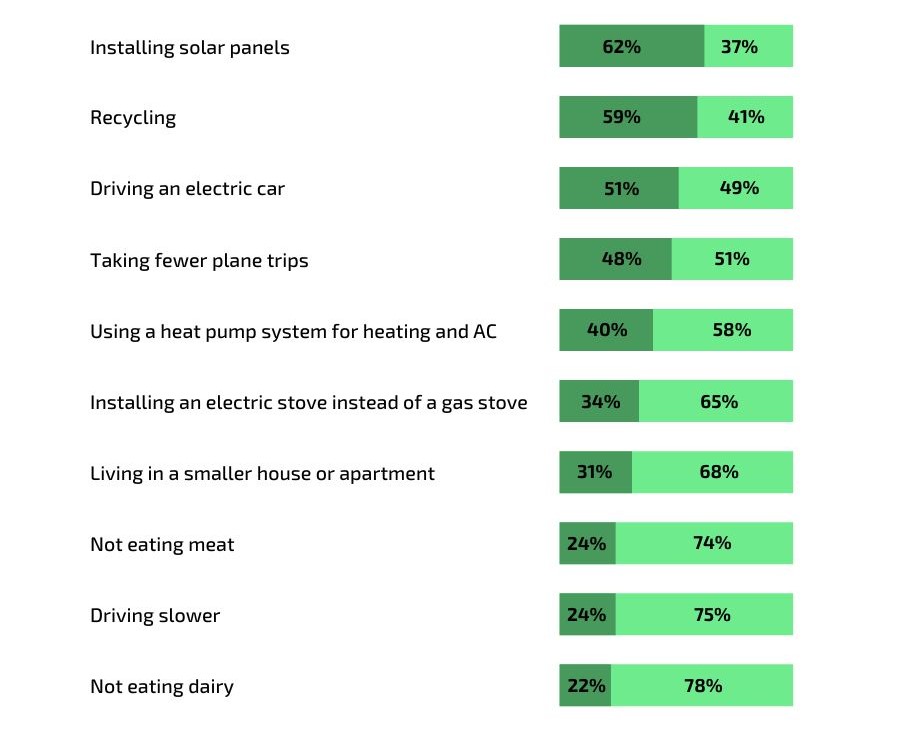You’re doing it wrong: Recycling and other myths about tackling climate change
Washington Post, August 28, 2023
A slim majority of Americans think their individual actions can reduce the effects of climate change, according to a Washington Post-University of Maryland poll.
But do they know which actions are the most effective? Not quite.
The poll finds most people believe recycling has a lot or some impact on climate change. About three-quarters say not eating meat or dairy would have a little or no effect on climate change.
Climate experts say they’re wrong on those and other counts.
Here’s the full set of the poll responses:
Q: How much do you think each of the following actions would reduce someone’s impact on climate change?
(Dark green bar = think will have a lot/some impact; light green bar = think will have a little/not an impact at all.)

These incorrect assumptions pose a problem for those trying to cut their emissions. Though a single person’s carbon footprint may be small, taken together, these decisions can add up and prevent gigatons of emissions from entering the atmosphere.
“People are interested in taking action,” said Ann Bostrom, an environmental policy professor at the University of Washington. “But if they don’t know what’s most effective, then they don’t know what they’re accomplishing.”
Here’s what you need to know about reducing your carbon footprint.
What doesn’t work
The Post-UMD poll finds nearly 6 in 10 Americans think recycling will have a lot or some impact on climate change, the second most-highly rated action behind installing solar panels. About a third say the same for using an electric stove instead of a gas stove and 24 percent say driving slower.
But experts said those actions are unlikely to make much of a difference in reducing greenhouse gas emissions.
“These are not even really climate solutions,” said Jonathan Foley, executive director of Project Drawdown, a nonprofit that evaluates climate solutions.
These misperceptions can arise, he said, when people don’t research climate solutions closely or attach outsize importance to actions that seem simple, such as getting rid of plastic straws. There have also been efforts from industry to mislead consumers about what is most effective, he added.
People tend to overestimate the climate benefits of recycling. One study led by a researcher at the University of Leeds placed recycling second-to-last among more than 50 actions people can take to reduce their carbon footprint.
That’s also not to say these measures don’t have other benefits — recycling can help the environment by reducing waste, and switching to an electric stove can improve indoor air quality. However, that doesn’t make them climate solutions.
Stephen Mullis, 65, carefully sorts his garbage for any recyclable materials, but he’s worried that recycling isn’t as effective as he thought.
“I’m trying to do my part, but I’m not sure if it’s working on down the line,” he said.
What does work
Among the 10 actions Americans were polled on, experts said flying less and cutting out meat and dairy are among the best steps people can take. Most Americans don’t realize that — 51 percent say flying less would make a little or no difference, and about three-quarters say the same for cutting out meat and dairy.
Though flying accounts for a small share of global emissions, a few flights a year can quickly add up to be the largest contributor to your carbon footprint.
Emily Wang, 23, hasn’t flown since the fall of 2021. She said the decision was the logical outcome of her concern about climate change and the contribution of flying to her carbon footprint, though it required some lifestyle changes, such as reducing how often she travels from Massachusetts to see her parents in Michigan.
“It might seem obvious, but a lot of people know about climate change and still fly a lot,” she said. “It doesn’t always come naturally.”
Meat and dairy are also heavy hitters. Project Drawdown estimates that if three-quarters of people around the world adopted a plant-rich diet by 2050, they could avoid the release of more than 100 gigatons of emissions.
“It doesn’t mean you can’t occasionally enjoy a really nice filet mignon for a celebration,” Foley said. “But if you cut down on red meat, it’s both a healthy dietary choice and a way to reduce emissions.”
If both experts and Americans agree on one thing, it’s that installing solar panels can help fight climate change. More than 60 percent of Americans say doing so would reduce their climate impact at least to some degree.
Greening your home
An electric heat pump is one of a range of improvements around the house that can be made to reduce your carbon footprint.
Foley said there are also a range of improvements you can make around your house to reduce your carbon footprint — and potentially rack up other benefits.
That includes driving an electric car and using a heat pump, options that 51 percent and 40 percent of Americans, respectively, say would have a lot or some impact on climate change, according to the Post-UMD poll.
“If everyone in America had an energy audit and spent a few hundred dollars at Home Depot on a programmable thermostat and a little bit of caulk, that would be worth a couple of nuclear power plants worth of energy,” Foley said.
Sam Gude, 46, is applying that advice in his two homes. He’s upgraded the insulation in one of them and is planning to switch the other from gas to electric heating. These changes reduce his carbon footprint, but they also save him money, he said.
“I try to find as many win-wins as possible,” he said.
Chris Field, the director of Stanford’s Woods Institute for the Environment, cautioned the benefit of changes around your home are often proportionate to its size. (The poll finds about 3 in 10 Americans say living in a smaller house or apartment will make a difference.)
“If you have 10 times as much space as you need, you will have close to 10 times as much of an environmental footprint,” he said.
The big picture
Americans have grown less confident that their individual actions can reduce the effects of climate change. In 2019, 66 percent said they could personally make a difference, a number that has fallen to 52 percent this year, with the sharpest declines among Republicans and independents.
Some experts say those feelings are not unfounded. Individual actions can only go so far, said Field. “The most important thing anybody can do is to vote for a climate-friendly government agenda,” he said.
However, Kimberly Nicholas, a sustainability scientist at Lund University in Sweden, said the United States is home to some of the wealthiest people in the world, and they have a responsibility to reduce their carbon footprint.
“Ninety percent of the world doesn’t need to reduce their emissions, but most readers of The Washington Post probably do,” she said.
The poll was conducted by The Post and the University of Maryland’s Center for Democracy and Civic Engagement from July 13 to 23. The sample of 1,404 U.S. adults was drawn from the NORC AmeriSpeak Panel, an ongoing survey panel recruited through random sampling of U.S. households. Overall results have a margin of sampling error of plus or minus 3.5 percentage points.
The original article is located online in the Washington Post, August 28, 2023.
See what else we have in GTEC’s Communication & Media (formally GTEC Blog)! Read articles on climate change, sustainability, education, and more!

